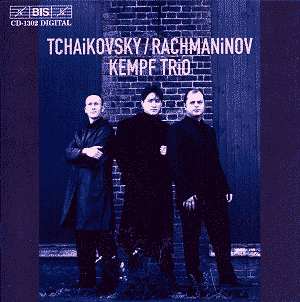I’ve always regarded Tchaikovsky’s A minor Piano Trio
as among his greatest achievements, and though the record catalogue
boasts a number of fine versions, I still feel it is somewhat under-rated,
even by dedicated Tchaikovskians. The sheer scale and length of the
piece could be one problem. How many piano trios do you know that run
to over 52 minutes? This is longer than many of his symphonies, and
there’s no doubt that this is a big work, conceived on a grand scale.
These epic qualities are just what the Kempf Trio seems to revel in,
and this excellent new Bis recording does full justice to the composer’s
vision.
The work is dedicated "To the memory of a great
artist" (Tchaikovsky’s mentor Nikolai Rubinstein), and the long,
often unwieldy first movement, cast as a giant elegy in two parts, is
well handled by these players. They have the measure of the difficult
structural elements that so foxed Hanslick in the first Viennese performance
of 1899 (featuring a certain F. Busoni on piano), when the esteemed
critic wrote of the "…merciless length" of the piece, and
wishing that this would also be the last performance. As we all now
well know, the composer took harsh criticism like this very badly, and
this led to him offering cuts for the work, rather like he did in the
near contemporary (and similarly under valued) Second Piano Concerto.
The Kempf Trio have no need for such drastic action, instead relying
(rightly) on keen musical instinct and flexibility of tempo and phrasing
to make it work. The gloriously melancholic opening melody (is there
a finer one in all Tchaikovsky?) is spun with real feeling for line
and contour, and when the sonorous second subject duly arrives (around
3’17), we feel that the shift in mood and colour is just right. The
impression that these players are really listening to each other is
confirmed around 7’40, where the delicate balance and interplay of the
three instruments is both delightful and moving. I also found particularly
impressive the repose of the big tune’s re-statement in adagio form
(start of track 2), where Freddy Kempf’s own superb pianism leads the
way.
The second movement is no less massive, a 21 minute
set of variations on a Russian folk tune, followed by a touching return
of the opening elegy. Here Tchaikovsky’s imagination is given full rein,
and we run the entire gamut of emotion and invention. Highlights abound;
there is Kempf’s digital dexterity in variation 3; the lugubrious, Russian
Jewish-sounding variation 4, so reminiscent of Mussorgsky; no.8, the
big fugal workout, feels like a finale, but is the composer flexing
his contrapuntal muscles to thrilling effect; the delicately muted string
playing of variation 9 and my own favourite, variation 10, which is
a wonderfully free-wheeling mazurka, played here exactly as marked,
con brio. There is a real improvisatory flair with this young group,
and one constantly feels they not only love the music but also fully
understand its intellectual and structural ingenuity.
This Bis recording offers as a filler the short G
minor Trio élégiaque by Tchaikovsky’s heir and soul
mate, Rachmaninov. The Trio pays hommage melodically (the main theme
is very similar to that in Tchaikovsky’s Trio), but has its own composer’s
stamp at every turn. The lento lugubre tread of the opening has
the feel of The Isle of the Dead to come, and the funeral march
ending looks to Tchaikovsky’s Pathétique finale as well
as forward to many of Rachmaninov’s mature pieces. The performance is
excellent, the gloomy seriousness offset by many deft musical touches.
Recording quality throughout is well up to house standards.
As I said at the outset, there is an array of recorded
competition, but this new release need fear none of them. The couplings
vary enormously, but this is as apt as any of them (though not as generous
as some). For the main work itself (which must be the real reason for
buying) the purchaser of this new release will be amply rewarded with
playing of great intelligence, intellectual rigour and keen spontaneity.
Who could ask for more?
Tony Haywood
